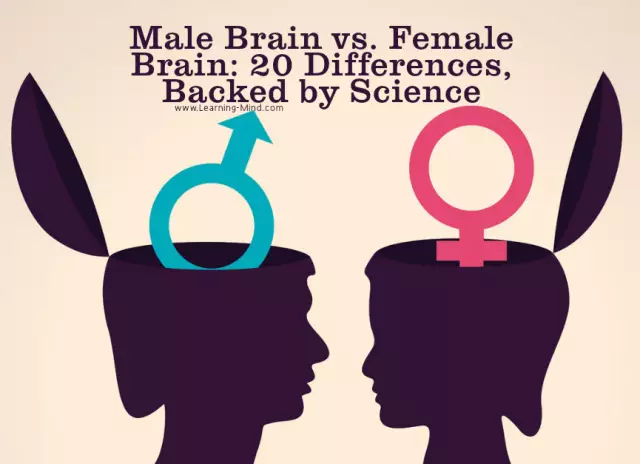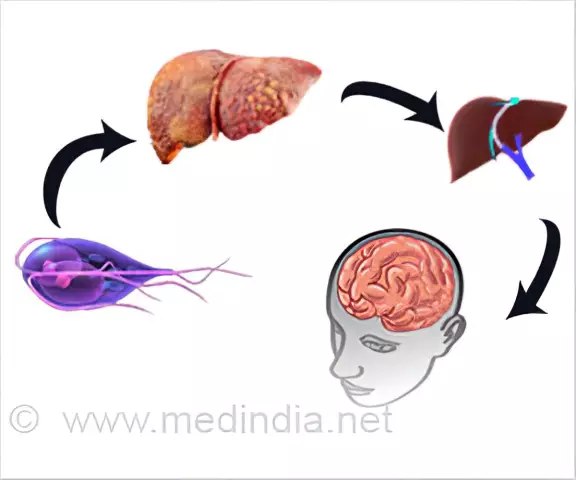- Author Rachel Wainwright wainwright@abchealthonline.com.
- Public 2023-12-15 07:39.
- Last modified 2025-11-02 20:14.
Hypertensive encephalopathy - what is it?
The content of the article:
- Causes and risk factors
- Signs of hypertensive encephalopathy
- Diagnostics
- How to treat hypertensive encephalopathy of the brain
- Forecast
- Video
Hypertensive encephalopathy - what is it? This is a pathological condition that is a dysfunction of the human brain, developing against the background of hypertension. This pathology is recorded in patients of all age groups. The ICD-10 code for hypertensive encephalopathy (hypertensive encephalopathy) is I67.4.
One of the significant differences between hypertensive (discirculatory) and atherosclerotic encephalopathy is the predominant lesion not of large intra- and extracranial blood vessels, but of small-caliber cerebral vessels.

Hypertensive encephalopathy - a brain disease caused by arterial hypertension
The division into hypertensive and atherosclerotic encephalopathy is rather arbitrary, since against the background of arterial hypertension, atherosclerotic lesions of the blood vessels of the brain occur. In such cases, a diagnosis of mixed encephalopathy is established.
Against the background of the disease, pronounced cognitive disorders, tissue necrosis, and impaired functioning of a number of organs and systems develop.
With timely diagnosis and adequate treatment, the changes that have occurred can be reversible.
Causes and risk factors
The disease occurs as a result of a violation of blood flow through the altered arteries of the brain. Most often diagnosed in adult patients under 45 years of age. Even a single increase in blood pressure can negatively affect the state of the central nervous system. According to a number of studies, a regular increase in blood pressure (BP) up to 160 by 95 mm Hg. Art. increases the risk of developing hypertensive encephalopathy by 4 times.
With a moderate increase in blood pressure, a defense mechanism is activated that prevents rupture of small-caliber blood vessels and stabilizes the pulse pressure in different parts of the arteries. With a frequent increase in blood pressure, the walls of small and medium-sized vessels hypertrophy, which leads to a narrowing of the vessel lumen and the development of chronic hypoxia in tissues and organs, including the brain.
The main causes of hypertensive encephalopathy are hereditary predisposition, diseases of the urinary and central nervous system. Pathology often develops with eclampsia, acute nephritis, stroke, transient ischemic attack (acute transient circulatory disorders of the brain), pheochromocytoma, blood pressure surges, complicated hypertensive crisis. Usually, the pathological process develops in patients with grade 2 hypertension. At 3 degrees of uncontrolled arterial hypertension, discirculatory encephalopathy is observed in all patients. Dangerous and oligosymptomatic hypertensive crises, and headless hypertension, in which diastolic (lower) pressure mainly increases.
Risk factors include increased mental stress, stress, high cholesterol levels, an increase in the number of platelets in the blood, alcohol abuse, and the use of drugs.
Signs of hypertensive encephalopathy
The clinical picture of the disease depends on the extent and location of the lesion of the nervous tissue.
At the initial stage, the signs of the pathological process may not be expressed, and the disease can be detected by chance during an examination by a neurologist.
With the progression of the pathological process, the patient develops sensory, cognitive and motor disorders of varying severity.
Encephalopathy with high blood pressure can be acute or chronic.
The clinical signs of acute hypertensive encephalopathy include an intense headache of a pressing or bursting character, which is first localized in the occipital region, and then spread to the entire head, dizziness, disorientation in space and time, nausea and vomiting that does not bring relief, convulsions, visual impairment (partial or complete loss of vision, swelling of the optic nerve), hearing impairment, anxiety, impaired consciousness may develop. The condition worsens with sneezing, coughing, tension of the neck muscles, possibly a violation of superficial sensitivity.
Acute encephalopathy in hypertensive crisis precedes stroke in some cases.

The most common symptom of hypertensive encephalopathy is intense headache.
Chronic encephalopathy has 3 stages.
- Characterized by frequent headaches of various localization, dizziness, impaired memory and attention, anisoreflexia. Sleep disturbances, weakness and fatigue are observed. At neurological examination, vestibulo-atactic syndrome, impaired sensitivity and paresis are absent.
- The decline in cognitive functions continues, emotional lability, tearfulness, and resentment are observed. The patient often incorrectly assesses his condition and refuses treatment, which leads to the rapid progression of the pathology. Neurological examination reveals discoordinating, dysmnestic, pyramidal, amiostatic syndrome. As a rule, one of them dominates. The ability to work is significantly reduced.
- Pseudobulbar syndrome appears. Epileptic seizures, lacunar infarction, and dementia may occur. Parkinsonism often develops in elderly patients. Cognitive impairments become the cause of impaired everyday and social adaptation. Patients lose the ability for purposeful activity, they need constant nursing care and outside help. This can serve as a reason for recognizing the disability and incapacity of the patient with the assignment of one or another group of disability.
Diagnostics
Diagnostics is carried out in several stages. First of all, the patient is diagnosed with hypertension or symptomatic arterial hypertension, the form and causes of the disease are specified. Examination by a neurologist is aimed at determining the clinical signs of hypertensive encephalopathy.
To make a diagnosis, they resort to computed or magnetic resonance imaging. At the first stage of the disease, any changes are usually not detected, but with the further development of the disease, ischemic foci with a cavity in the center (lacunae) are revealed, the appearance of which is not associated with a stroke. In contrast to atherosclerotic encephalopathy of the brain with hypertensive, the pathological process mainly involves the white matter of the brain and subcortical structures.
As part of the differential diagnosis, consultation with a psychiatrist may be required. To exclude a number of diseases (anemia, toxic brain damage in renal or hepatic failure, endocrine diseases), laboratory tests (general and biochemical blood tests) are carried out. In addition, an analysis for syphilis is prescribed (in order to exclude the defeat of syphilitic encephalopathy). To determine generalized atherosclerotic lesions of blood vessels, Doppler ultrasound of the cervical arteries is performed. Evaluation of the bioelectrical activity of the brain is carried out using electroencephalography. Measurement of cerebrospinal fluid pressure and its subsequent laboratory study are carried out using a spinal puncture.
Differential diagnosis of acute encephalopathy is carried out with hemorrhagic stroke, subarachnoid hemorrhage, toxic encephalopathy.
How to treat hypertensive encephalopathy of the brain
First of all, adequate antihypertensive therapy is selected, which allows you to gradually reduce blood pressure in order to avoid total cerebral ischemia.
Long-term combined drugs are often used - combinations of diuretics, calcium antagonists, angiotensin-converting enzyme inhibitors, beta-blockers. Achieved and maintained such a level of blood pressure, at which the threat of the risk of cerebrovascular complications is minimal.
In the acute form of the disease, a choice is made in favor of diuretics due to their anti-edema effect. When taking them, it is necessary to control the balance of electrolytes in the blood.
In chronic encephalopathy, in addition to antihypertensive drugs, drugs are used that improve blood circulation (thrombolytics, antiplatelet agents), drugs that stimulate metabolism, and vitamins. With severe cognitive impairment, neurometabolic stimulants are prescribed. In the presence of behavioral and affective disorders, normotimics, sedatives, antidepressants can be used.

Adequate treatment can lead to complete involution of signs of encephalopathy
Patients are advised to spend more time outdoors, avoid stressful situations, and normalize sleep and rest.
Effective treatment of arterial hypertension in the early stages can prevent the development of encephalopathy, however, patients with grade 1 hypertension often do not have pronounced symptoms of high blood pressure and are unaware of their pathology, which is why the most favorable moment of therapy is missed.
Forecast
Correctly selected treatment makes it possible to slow down the progression of the disease, and in some cases allows to achieve its reverse development. With timely diagnosis and adequate treatment, it is usually possible to preserve the household, social and professional adaptation of the patient for a long time, to improve the prognosis of the disease.
Multiple small focal lesions of the patient's brain reduces the effectiveness of drug treatment of the disease and significantly worsens its prognosis, even if good blood pressure control is achieved.
Video
We offer for viewing a video on the topic of the article.

Anna Aksenova Medical journalist About the author
Education: 2004-2007 "First Kiev Medical College" specialty "Laboratory Diagnostics".
Found a mistake in the text? Select it and press Ctrl + Enter.






